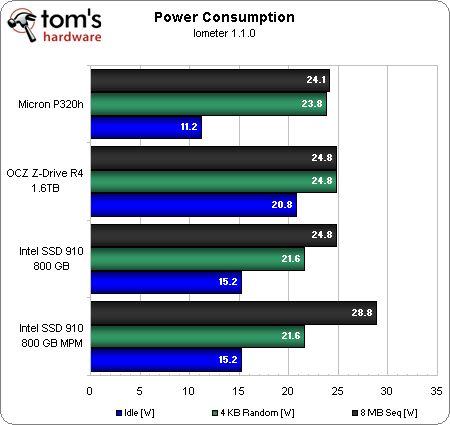Micron RealSSD P320h Review: A PCIe Drive Capable Of 3.2 GB/s
Announced earlier this year, Micron's RealSSD P320h PCI Express-based SSD promises to be an enterprise workhorse. A custom controller, single-level cell NAND, amazingly low latency, stellar random I/O, and incredible endurance combine to blow us away.
Power Consumption
As we've discussed previously, an SSD that draws 25 W is no power-saver on its own. However, when you add up the number of 2.5" SAS-based disks spinning at 10,000 RPM it'd take to match the performance of a drive like the P320h, the savings are significant.
Just like the SSD 910 we reviewed previously, Micron's RealSSD P320h is also rated at 25 W. The P320h does have a lower idle power draw, but considering the environments these drives are intended to serve, they won't be sitting idle very long.
The P320h butts right up against its power ceiling subjected to both sequential and random operations. That's good news because any extra consumption would translate into more heat. The P320h also requires 1.5 m/s of airflow, which allows it to operate at up to 50 degrees C. As with most PCIe cards rated at 25 W, normal server airflow is enough to keep it cool. However if your rack-mounted machines suffer from restricted ventilation, the P320h will get very hot, very fast.
Get Tom's Hardware's best news and in-depth reviews, straight to your inbox.
Current page: Power Consumption
Prev Page Enterprise Video Streaming Performance Next Page Micron's RealSSD P320h: The Future Of Enterprise-Class SSDs?-
mayankleoboy1 i dont see this as the future of consumer SSD's, just like a 16 core CPU is not the future of consumer CPU's.Reply -
bawchicawawa mayankleoboy1i dont see this as the future of consumer SSD's, just like a 16 core CPU is not the future of consumer CPU's.Reply
Such an apples to oranges comparison... -
memadmax Eliminating the SAS controller is the logical way to have these pci-e based ssd drives...Reply
Kinda surprised something like this didn't come out first as it makes more sense.... -
mayankleoboy1 bawchicawawaSuch an apples to oranges comparison...Reply
really ? Increasingly, performance is basically dependent on extracting parallelism. Whether in storage or in CPU performance.
Desktop/Mainstream users just dont do so much in parallel that they can fully use all the hardware. -
JOSHSKORN mayankleoboy1i dont see this as the future of consumer SSD's, just like a 16 core CPU is not the future of consumer CPU's.I see a purpose for 16 core processors. How are we going to otherwise be able to run Crysis 6?Reply -
mayankleoboy1 JOSHSKORNI see a purpose for 16 core processors. How are we going to otherwise be able to run Crysis 6?Reply
Use a 5000 core GPU ? -
youssef 2010 ArticleAlthough read performance is out of this world, the RealSSD P320h's write performance isn't nearly as spectacular. That's not to say the drive doesn't do well; it's just not as impressive after looking at those massive read numbers. read performance was out of this world, the write performance wasn't nearly as spectacular. Now, that's not to say that the P320h doesn't perform well, it's just not as impressive as the read resultsReply
????????!!!!!!!!!!! -
abbadon_34 After all these years it's nice to see the OCZ Revo at least mentioned. Considering a bootable PCI-E x4 SSD can be had for under $200 for over 5 years now, and is on it's 4th+ generation, one can only wonder why it's been ignored for so long.Reply -
Marcus52 Micron deserves a pat on the back for this one!Reply
Thanks for the review, love to see this kind of advancement and a peak into the future new hardware brings with it, even if it isn't directly applicable to me at this point in time.
